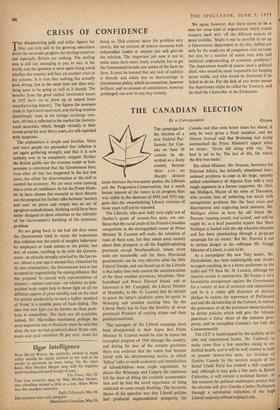THE CANADIAN ELECTION
The Liberals, who now hold sixty-eight out of Quebec's quota of seventy-five seats, are con- fident that the racial pride of his French-Canadian compatriots in the distinguished career of Prime Minister St. Laurent will make the retention of most of them easy, but they admit some anxiety about their prospects in all the English-speaking provinces except Newfoundland, whose seven seats are reasonably safe for them. Provincial governments can be very effective allies for their Federal friends, and one handicap of the Liberals is that today they only control the administrations of the three smallest provinces, Manitoba, New- foundland and Prince Edward Island, and so lukewarm is Mr. Campbell, the Liberal Premier of Manitoba, to Mr. St. Laurent that he refused to grace the latter's platform when he spoke in Winnipeg and avoided meeting him. So the Liberal Party has to face the hostility of seven provincial Premiers of varying stripes and their political machines.
The managers of the Liberal campaign have been disappointed in their hopes that Prime Minister St. Laurent would be able to repeat his triumphal progress of 1949 through the country, and during his tour of the western provinces there was evidence that the voters had become bored with his electioneering tactics, in which 'folksy' talks to small audiences and benedictions of schoolchildren were staple ingredients. At places like Winnipeg and Calgary his audiences fell far short of filling the available accommoda- tion and he had the novel experience of being subjected to some rough heckling. The favourite theme of his speeches was that Liberal policies had produced unprecedented prosperity for Canada and that even better times lay ahead, if only he were given a fresh mandate, and the Ottawa Journal said that Browning had neatly summarised the Prime Minister's appeal when he wrote : 'Grow old along with me; The best is yet to be, The last of life, for which the first was made.'
His ablest Minister, Mr. Pearson, Secretary for External Affairs, has belatedly abandoned inter- national problems to cope in his huge, sparsely settled constituency of Algoma East with a very tough opponent in a former supporter, Mr. Mer- ton Mulligan, Mayor of the town of Thessalon, who accuses him of bothering too much with unimportant problems like the Suez crisis and disarmament and neglecting local interests. Mr. Mulligan claims to have his old friend Mr. Pearson 'running scared, real scared,' and well he might be, as a local journalist reports that Wert Mulligan is loaded with the old whambo-whambo and has been pinwheeling through a go-go-go campaign for six weeks.' But Mr. Pearson is not in serious danger as his colleague Mr. Gregg, Minister of Labour, is said to be.
As a campaigner the new Tory leader, Mr. Diefenbaker, has been indefatigable and, thanks to expert coaching, he is a better performer on the radio and TV than Mr. St. Laurent, although his raucous accent is unattractive. He frames a very formidable arraignment against the Government for a variety of sins of omission and commission and he is a rather glib dispenser of election pledges to restore the supremacy of Parliament and end the dictatorship of the Cabinet, to redress the grievances of all the provinces about taxation, to devise policies which will give the Atlantic provinces a fairer share of the national pros- perity, and to strengthen Canada's ties with the Commonwealth.
The CCF is handicapped by the inability of its able and experienced leader, Mr. Coldwell, to make more than a few speeches owing to en- feebled health, and it will be well content to hold its present twenty-two seats. An invasion of Eastern Canada by the western moguls of the Social Credit Party has evoked a chill response and, although it may gain a few seats in British Columbia, it will remain a sectional faction. At this moment the political soothsayers predict that the election will give Canada a better Parliament through a substantial reduction of the huge Liberal majority without wiping it out.


































 Previous page
Previous page